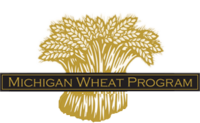Lansing, Mich. (July 30, 2018) – Michigan wheat farmers working through the Michigan Wheat Program partnered again this year with Michigan State University to include for the 6th year, a high-management component as part of the MSU Wheat Performance Trials. The results of that research have been compiled and just released to the public.
Farmers will certainly want to study results of the 110 different varieties tested in plots across Michigan before making seed purchasing decisions for planting this fall, according to MSU wheat specialist Dennis Pennington.
Michigan wheat farmers out-perform the nation when it comes to yields per acre. For example, this year USDA’s NASS-Great Lakes office has forecast a record yield of 90 bushels per acre and a total production figure of 44.1 million bushels. The national average yield is 48 bushels per acre.
“We’d like to think that the Michigan Wheat Program’s focus on high-management research and extension outreach, along with Michigan’s unique environmental conditions, and especially these high-management plot comparisons help drive increased productivity and quality in the state,” said David Milligan, chairman of the Michigan Wheat Program board and a wheat farmer from Cass City.
“Every wheat farmer in Michigan should be looking at their farm management and how the various varieties respond to high management to make the decision as to what is the best variety for them on their farm,” Milligan said.
This year’s Performance Trials include 61 commercial wheat varieties. In addition, 49 experimental wheat lines were evaluated – up significantly from the 26 experimental seed lines tested last year. The seed lines were developed by 13 organizations including MSU, Michigan Crop Improvement Association, and several seed companies.
“When selecting varieties, it’s important to look at multi-year data from locations that are closest to the soil type and conditions you have on your farm,” commented Pennington. “Farmers should study
individual varieties across all the parameters evaluated in the trials including yield, test weight and disease ratings. This report is an unbiased, scientifically-based evaluation of varieties in various Michigan regions. It’s also a valuable tool to help farmers make decisions about which varieties to plant on their farms.”
Wheat trial details. MSU’s wheat research team has planted wheat trial plots for more than 17 years. During the 2017-2018 growing season, trials were held on private farmland in six counties: Allegan, Clinton, Huron, Lenawee, Sanilac and Tuscola.
This year’s trials were planned to have two farms that had both conventional and high-management plots, to create a “same farm” comparison. While this comparison is available for review in Tuscola County, the Clinton County site received an extra 90 pounds of nitrogen and is less comparable.
Farms hosting the trials included:
- Stuart Bierlein of Reese (Tuscola County-two sites);
- Harvey Jipping of Hamilton (Allegan County);
- Darwin Sneller of Owendale (Huron County);
- Louis Faivor of St. Johns (Clinton County);
- Woods Seed Farm of Deerfield (Lenawee County); and
- JGDM Farms of Deckerville (Sanilac County).
Definition of high-management trial. High-management trials included:
- an additional 30 lbs. of nitrogen per acre (28 percent N); and
- Prosaro® at average flowering date in each location.
“The check-off board will again consider supporting high management treatments for the 2018 Michigan State Wheat Performance Trials at their meeting in a couple of weeks,” said Jody Pollok-Newsom, the program’s executive director. “There is such a wealth of knowledge in this nineteen-page report, that I am sure the board will continue its support and remain proud to play a role in advancing knowledge about the future of high management wheat production in Michigan.”
To see the results of the 2018 trials, go to www.miwheat.org and click on the “Just out! 2018 MSU Variety Trials” tab at the top of the “What’s Hot” box. The Michigan Wheat website also includes links to high-management Performance Trials data from 2013-2017, and a link to data from 2012 and prior years. MSU researchers and the Michigan Wheat Program recommend reviewing at least three years of trial research when making decisions for your farm.
The MWP is a check-off organization funded by nearly 8,000 wheat farmers who grow wheat in 50 of Michigan’s 83 counties. Michigan wheat farmers plant 500,000 acres of red and white winter wheat annually, resulting in a crop of 40 million bushels on average. The state’s wheat crop has a total economic impact of about $388 million annually.
